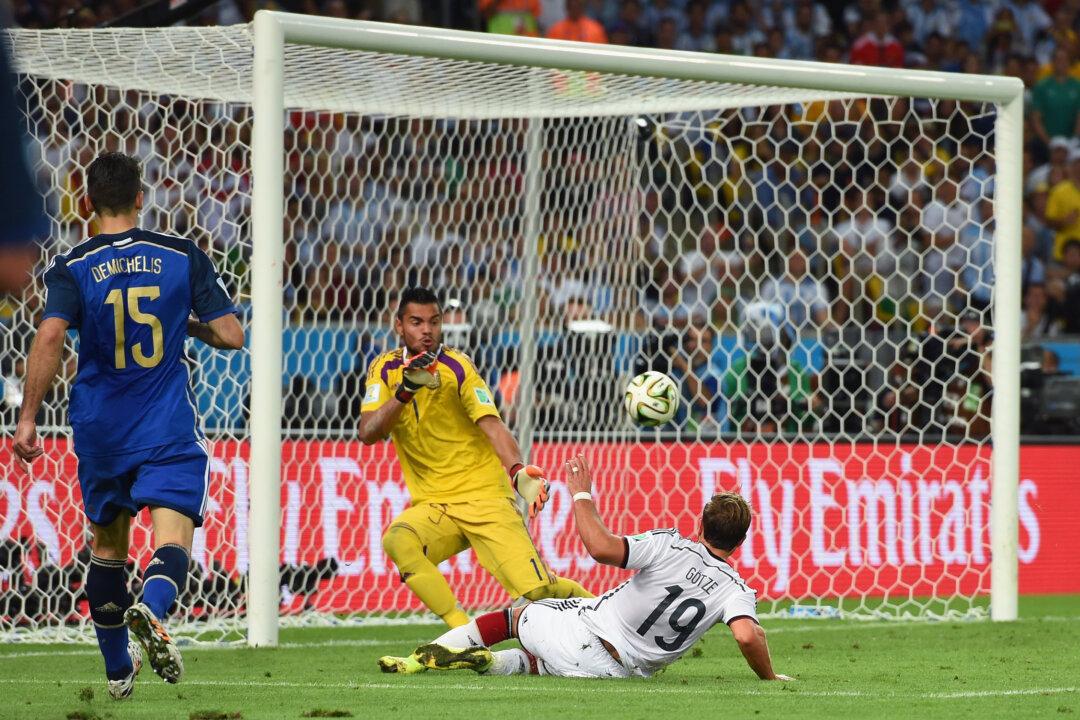A number of crude jokes were being spread on Twitter following Germany’s victory over Argentina in the World Cup final.
The most common one was: “Argentina did Nazi that coming,” with “Nazi” being a play on words for “not see.”
A number of people, however, condemned the users spreading the Nazi jokes for being offensive and insensitive.
“Why do people feel the need to make nazi jokes because Germany won!? Really infuriates me!” one person said on the social media site.
Others were simply sick of the jokes.
Added another: “All these nazi posts getting annoying.”
Here’s The Associated Press update for the final:
RIO DE JANEIRO (AP) — With two quick touches, Mario Goetze ended Germany’s 24-year wait for another World Cup title.
Goetze scored the winning goal in extra time to give Germany a 1-0 victory over Argentina on Sunday in a tight and tense World Cup final that came down to one piece of individual skill.
Goetze, who wasn’t born when West Germany beat Argentina in the 1990 final, controlled a cross with his chest in the 113th minute and in one fluid motion volleyed the ball past goalkeeper Sergio Romero and inside the far post.
It was a goal that gave Germany its fourth World Cup title in its eighth final, and left Argentina star Lionel Messi still walking in the shadow of his compatriot Diego Maradona, who led his country to the 1986 title.
Goetze had come on as a substitute for Miroslav Klose at the end of regulation time and the 22-year-old midfielder’s fresh legs made the difference.
Andre Schuerrle broke down the left flank, sending his cross into the area, and the Bayern Munich player did the rest with a clinical finish. The goal echoed that of Andres Iniesta’s four years ago, when the midfielder scored in similar fashion but from the other side of the area to give Spain a 1-0 extra time win over the Netherlands.
For Germany, the win ends a string of near misses since winning its last major title at the 1996 European Championship. The team lost the 2002 World Cup final to Brazil and lost in the semifinals in both 2006 and 2010.
It is Germany’s first World Cup title as a unified nation. It was also the third World Cup final between these countries and had been billed as a matchup between the perfect team and the perfect individual, pitting Germany’s machine-like unit against the brilliance of Messi, the four-timeworld player of the year.
But in the biggest game of his career, Messi came up short.
He had one good chance to score when he was sent free in the area just after the halftime break, but sent his shot wide of the far post. It was a difficult angle, but still the type of chance he so often scores from.
Messi threatened intermittently throughout the match, but was effectively neutralized for long stretches. When he did try to break forward with one of his quick dribbles, he was surrounded by the German defense.
His free kick in the 120th minute went well high.
When the final whistle blew, Germany players collapsed in a pile in the middle of the pitch, while Messi walked with his hands on his hips toward the center circle.
Up until the winning goal, the game was more notable for top-class defending than creative attacking, but both teams had their share of chances.
Gonzalo Higuain wasted an opportunity by firing wide when gifted a chance in a one-on-one with Neuer, and later had a goal ruled out for offside.
Germany defender Benedikt Hoewedes hit the post just before halftime with a header from a corner, and ineffective finishing plagued both sides the rest of the way.





